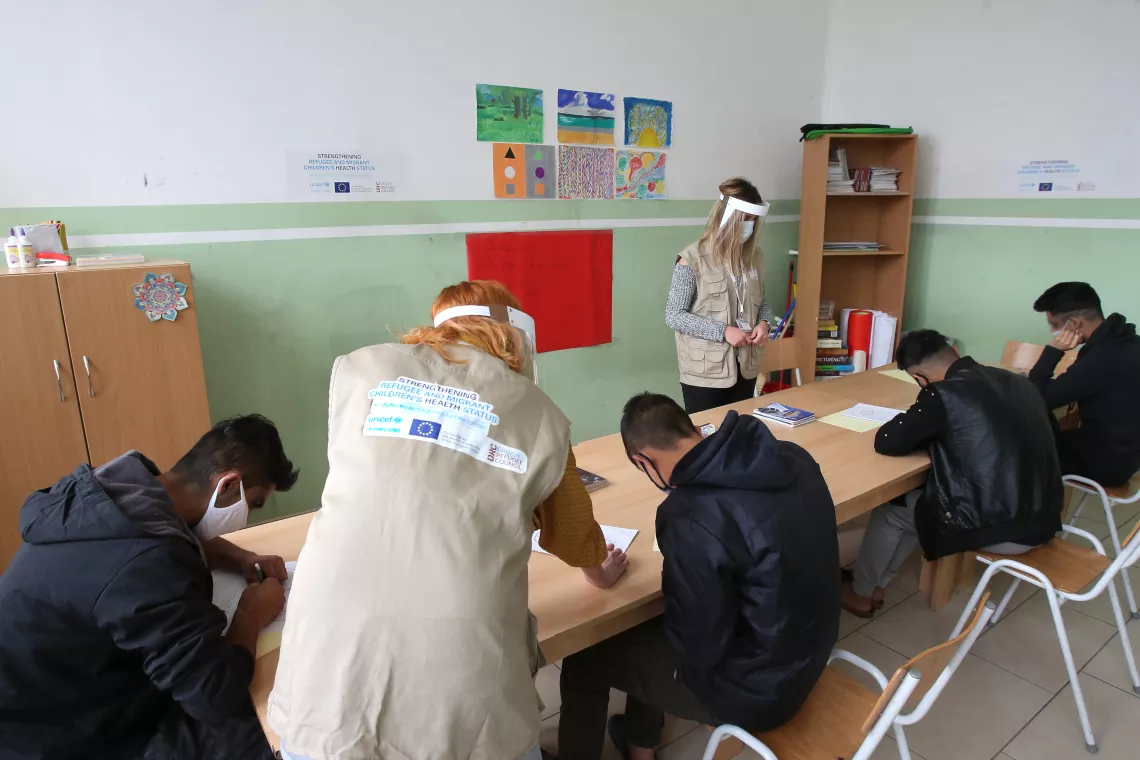Safely and securely towards a new life
The COVID-19 pandemic has further challenged the health status of refugee and migrant children
- Available in:
- Srpski
- English
Sjenica, Serbia, December 2020 - The first days of December are cold in Sjenica, a mountain town in southern Serbia at an altitude of over one thousand meters. The Refugee Reception Centre in this town accommodates only children. Almost thirty of them. Employees of the Danish Refugee Council, UNICEF’s partner organization in improving the health status of refugee and migrant children, are expecting more than a hundred new boys in Sjenica in the next couple of weeks. They are already prepared for their arrival.Several activities and workshops are currently being implemented with the boys in the Centre to help the children overcome traumas from their journey to Serbia and so they can get back a sense of security. The children are also learning how to organize their time at the Centre, acquiring age-appropriate skills and knowledge, as well as learning how to protect themselves from COVID-19.

Sixteen-year-old Ali travelled for four months from Afghanistan to Serbia without his parents. On the way he went for days without water, he was bullied and thrown off the bus and faced the many dangers of travelling at night. Ali says that he is happy with his life at the Centre in Sjenica because he finally feels safe and is learning a lot.
“It’s clean. It’s awesome! During a lesson on COVID-19 I learned about prevention measures, how to go to the store, how to put on a mask, and how to avoid crowds. They would never give us masks anywhere before this. But in Serbia we got them for free, along with hygiene products. There’s a positive atmosphere in the camp. There’s no cold or hunger. Thank God we left all that behind now,” says Ali in the presence of an interpreter, but also his legal guardian who is taking care of Ali’s interests.

Learning is something that’s in Ali’s best interest. While secondary school is not compulsory in Serbia, UNICEF, in cooperation with a partner organization, is bridging the education gap by striving to provide access to knowledge and skills that may be useful to Ali later in life. Ali already has some favorite courses: “I study Serbian, but I really like the creative workshop. I can paint there.”
The COVID-19 pandemic has further challenged the health status of refugee and migrant children. That’s why UNICEF has included prevention and information dissemination activities in its interventions targeting the refugee and migrant population.
Thanks to the support provided by the workshop staff, there have been no cases of infection recorded in the Centre in Sjenica so far.
Marko Djoric, from the Danish Refugee Council, says that several professional training sessions are being prepared, which will enable these children to acquire vocational skills. Now, he says, the most important thing is that the children feel protected, safe, that their free time is organized, and that their mental health is preserved.
“For many of them, this is their first encounter with education of any kind. They are also learning about child rights for the first time. However, our most important success is that we are looking after their mental health - ensuring healthy development and helping them cope with toxic stress. During their journey, [the children faced] violence, hunger, the cold. And this place is a safe haven for them.”
Although workshops and activities are not compulsory, children always attend them. Fourteen-year-old Sadat has been travelling alone for two and a half years. He started his journey when he was eleven. Until a week ago, he was on the border between Bosnia and Herzegovina and Croatia. And then he crossed back into Serbia and came to the Centre in Sjenica. In the Centre, he is learning to write, draw, and he goes to Serbian language classes.
Through non-formal education children are being prepared for formal education, focusing on Serbian and English language classes, mathematics or other subjects of their choice that are adapted for children with or without previous formal education. Recreational activities such as sports, watching films or creative workshops, help structure the time in the Centre in a healthy way, but also strengthen the inclusion into the local community.

“I’m attending many workshops. In addition to the class on COVID-19, I’m also very happy when I go to the creative and recreational workshop and study Serbian. I love table tennis! I feel protected here. There is no violence. They taught us what to do if someone tries to behave like that, but it doesn’t happen [here].”
Protection monitoring is being carried out continuously through regular contacts with the children, local social protection institutions, and schools in order to provide children with adequate access to relevant services and to identify and address the most sensitive cases in an adequate and timely manner. Fortunately, there's no need for that in Sadat's case.
Refugees and migrants face increased health risks due to unfavorable factors in their countries of origin, as well as during their journeys in search of a better life.
The COVID-19 pandemic additionally challenged or the health status of refugee and migrant children. Through the Project “Strengthening Refugee and Migrant Children’s Health Status in Southern and South-Eastern Europe”, co-funded by the Health Programme of the European Union, UNICEF works to improve the health of refugee and migrant children through prevention and information dissemination activities within its interventions within the refugee and migrant communities. UNICEF’s successful cooperation with the Commissariat for Refugees and Migration of the Republic of Serbia and the health care and social protection systems is essential for improving the health and protection of refugee and migrant children. In centers like the one in Sjenica, this cooperation is at the highest level, all with the aim of improving the position of refugee and migrant children as much as possible.[1]
[1] The names of unaccompanied refugee and migrant boys have been changed for their protection.




